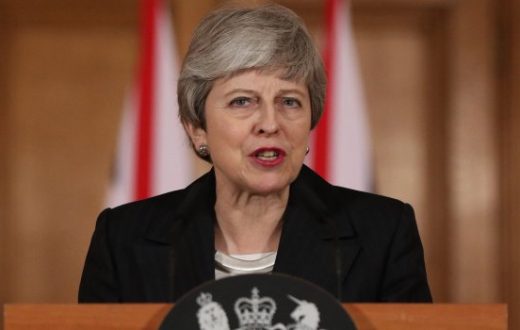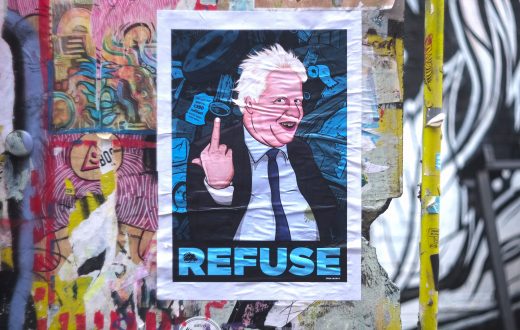Over the coming weeks, the frenzy of the financial markets will dominate the world’s attention. But what lies beyond the horizon in a post-Brexit world? Stratfor highlights the areas of the world that will be most affected by the latest phase of the European Union’s fragmentation.
Europe’s Unraveling
The United Kingdom will be locked in political turmoil. Prime Minister David Cameron has announced that he will resign by October, leaving his Conservative Party to appoint a successor to formally initiate negotiations on the United Kingdom’s exit from the European Union. Naturally, the British economy will take a hit as the pound and stock markets fluctuate, as capital flees and as companies relocate to continental Europe. Renewed talk of secession in Scotland will create yet another source of political uncertainty. If the United Kingdom loses access to the European common market, its main trade partners in the European Union — Ireland, the Netherlands and Belgium — will suffer. Consequently, they will work to expedite a free-trade agreement between Brussels and London. The stability of the ruling Tories needs to be monitored closely. Should the party fail to agree on a replacement for Cameron, early elections could be triggered, and by then the mood on Brexit could shift depending on the severity of economic pain.
It will be up to France and Germany to calm nerves and frame the financial volatility as an argument for integration. But calls for European unity belie the deep discord in the Continental bloc. Its core members have fundamentally different ideas on how to manage the eurozone, and the discrepancies will grow starker as Euroskeptic forces in France and Germany persevere, using the British referendum as their main tool to repatriate rights from Brussels. Without the United Kingdom to balance their differences, France and Germany will become more polarized, which will gradually erode the foundation of the European Union.
The eurozone’s periphery will come under fire once more, testing the European Central Bank’s promise to do “whatever it takes” to protect the currency area. In Italy, Spain, Greece and Portugal, political instability and financial uncertainty may conspire to inhibit already lackluster economic recoveries. A devalued pound, moreover, will make vacationing in the eurozone more expensive and will cut into critical tourism revenues in Southern Europe.
Having lost an important non-eurozone ally, Central and Eastern European countries such as Poland and Hungary and Northern European countries such as Denmark and Sweden will further distance themselves from the core of the European Union by, for example, rejecting EU politics or renegotiating the terms of the union.
Oil Recovery Cut Short?
Should the Brexit trigger a recession in Europe, demand for oil in the world’s second-largest oil market will fall even more. The decline would reverberate in the world’s fastest-growing oil markets, India and China, because lower British demand would mean slackened demand for oil overall, prolonging the global oil price recovery. If prices were to fall much below $30 per barrel, Saudi Arabia and other Gulf Cooperation Council members would reconsider production cuts or freezes. If prices remain comfortably above $40 per barrel, on the other hand, they could continue with their current strategy, maintaining market share and waiting out a price correction. Weaker oil prices will ultimately impair revenue, hitting oil exporters’ currencies even harder and forcing them to draw on reserves, maintain austerity and issue more debt than expected.A much more complicated issue is the future energy relationship between the European Union and the United Kingdom, which is still an integral part of the EU energy market. Deciding whether the United Kingdom will stay in the European Energy Community, which harmonizes Brussels’ energy policies with those of neighboring countries, such as Ukraine, will be a key area of negotiation going forward. Remaining would afford Britain the advantage of continued access to the common European energy market. The move could be a tough political sell for British citizens, however, since it would again surrender certain energy policymaking powers to Brussels — something that Brexit supporters would oppose.
China’s Short- and Long-Term Battles
Although the yuan has suffered in the immediate aftermath of the referendum, China’s central bank has the tools at its disposal to mitigate the fallout. In fact, the sudden depreciation of the yuan — happening for once without the scrutiny of global markets — could even be considered a blessing in disguise, alleviating pressures on the currency. Even so, the People’s Bank of China will face continued pressure to limit depreciation, and it will likely manage larger Brexit side effects with measures such as reserve requirement ratio cuts.The long-term impact could be far more profound. European markets, including the United Kingdom’s, account for a substantial 15.6 percent of China’s total exports. If the Brexit causes a recession that spreads from the United Kingdom to continental Europe, the toll on China’s exporters will compound the considerable pain that they have already experienced in the past few years.
Furthermore, the United Kingdom’s exit from the European Union could complicate Beijing’s efforts at structural financial and economic reform. As Beijing tries to manage the Brexit blowback, it may delay internationally focused measures to liberalize its financial sector. On the other hand, if heightened political uncertainty undermines the pound and euro as reliable international reserve currencies, China can take the opportunity to present the yuan as an attractive alternative. In the long run, however, the slowdown in export growth only further encourages liberalization mechanisms and other structural reforms to increase the efficiency of state-owned enterprises and to support development in the private sector. Beijing will continue to make gradual progress in addressing these challenges, using domestic social stability to determine how much liberalization to conduct and how quickly.
Dulling Monetary Policy in Japan
Meanwhile, Japan has the opposite problem. Already, the yen has jumped as financial flows head for safer assets. But the stronger yen complicates Abenomics, the economic reform plan of Prime Minister Shinzo Abe. Even without the Brexit, the Bank of Japan has had difficulties generating inflation and weakening the yen through aggressive monetary policies. Now, the bank may have no choice but to continue its monetary expansion, but the dulling effect of the monetary policy, combined with a stronger yen, will continue to impede Japan’s growth. Moreover, the currencies of Japan’s major trading partners, such as China, have weakened against the dollar as the yen has surged.Because Japan’s direct trade exposure to Europe is less than China’s — 10.6 percent of total exports and 3.3 percent of its gross domestic product — it will face less trade risk from a recession in the United Kingdom and European Union. But since Japan is instrumental to Asian supply chains running through Chinese and other Asian manufacturing hubs that ultimately lead to consumer markets in Europe, it will still feel the effects, albeit secondhand, of the tumult there.
As the effects of Abenomics’ monetary policies weaken, the Liberal Democratic Party may adopt more unconventional means to address Japan’s economic woes. For now, Abe’s opponents are deeply divided, so if there is going to be a shift, it will fall to the Liberal Democratic Party itself to devise an alternative to Abenomics. Two things to watch for are how much Japanese conglomerates such as Toyota, Nissan, SoftBank and Mitsubishi come under economic strain as a result of the Brexit and how the younger generation of Japanese corporate leaders over time break through political barriers to advance structural reforms.
ASEAN Rethinks Integration
Russia Can Thrive on European Division
Trade between Russia and the United Kingdom is marginal, but Russia will be concerned about the longer-term effect that a European economic slowdown would have on markets and financial volatility that would affect the ruble. Kremlin elites are already divided over how to deal with the current Russian economic crisis and foreign relations, and an economic crisis in Europe that puts further stress on the Russian economy will deepen that debate. Russia will be affected if Europe becomes more bearish on foreign investment in a worsened economic slump, but Moscow has also worked to isolate itself financially and economically over the past two years to cope with weaker ties with Europe. Russia will be driven to boost energy trade and overall economic ties with China and Japan as it looks east to compensate for lagging interest in the west.
Moscow, which has long seen London as an extension of Washington’s foreign policy, has tempered its anti-British sentiments while Britain has been a part of the European Union. But a Brexit could open the way for even chillier relations between the United Kingdom and Russia. This could affect Russia’s oligarchs, many of whom keep homes in London and list their Russian firms on the London Stock Exchange. The oligarchs are still crucial to the Russian state financially, so average Russians who work for the big oligarch firms or live in the oligarchs’ single-industry “monocities” could also be affected.
Trans-Atlantic Partners Stand Together
The next U.S. president will inherit the consequences of the Brexit and will have to decide how to navigate the evolving relationship between the European Union and the United Kingdom. At the same time, London will push for a free-trade deal with the United States as a way to secure a key consumer market for its exports. Globally, more bilateral trade deals are likely to be forged as larger, more ambitious multilateral trade agreements run into problems. Though the U.S. economy remains relatively robust and isolated from a trade standpoint, it will nonetheless be affected by a potential slowdown in Europe via financial linkages.Financial uncertainty triggered by the Brexit has likely ensured that the U.S. Federal Reserve will hold off on interest rate hikes for the remainder of the year, pushing its next rate increase into at least 2017, depending on the state of the global economy. In fact, markets are factoring in an increasing likelihood of an interest rate cut by the end of the year. A flight to financial havens will boost the dollar and crimp exports.
Turkey Haggles Hard With the EU
For Turkey, which for decades has been trying to get into the European Union, there is a hint of irony in the United Kingdom’s departure from the bloc. EU members will meet June 30 to discuss expediting Turkey’s accession. This is a bit pointless, however, and Turkey knows it. So long as the flow of migrants into Europe continues to fan the flames of Islamophobia, the government in Ankara can continue to bargain with Brussels for concessions, such as finalizing a deal on visa liberalization. British Prime Minister David Cameron has said Turkey will not get into the European Union for another 1,000 years — and he is probably right, assuming the bloc survives that long. The European Union, for its part, will keep the talks alive to sustain the migrant deal, but it will not exert all that much effort to bring Turkey into its ranks. Turkish President Recep Tayyip Erdogan is ready to spin his country’s inevitable rejection, saying he will call his own referendum for Turks to decide whether they even want to be part of the bloc at all. And so, with the European Union preoccupied with its disintegration and with Turkey preoccupied with the Islamic world, accession talks will be perfunctory at best. Ankara will focus its energy instead on maintaining trade and security links with the Europeans.The Brexit will jolt Turkey’s currency, the lira, at least for the short term. But the longer-term concern is the potential for the European Union to fall back into recession and make another deep cut into Turkey’s export markets. The European Union is Turkey’s largest trading partner, and the United Kingdom is the second-largest recipient of Turkish goods after Germany. Some 7 percent of Turkey’s exports go to the United Kingdom, and nearly 45 percent of its total exports go to the European Union. Lower oil prices have helped Turkey manage its deficit this year, enabling the central bank to make four consecutive interest rate cuts in the past four months. The central bank may reconsider that strategy in light of the financial uncertainty, but Erdogan will apply political pressure to keep borrowing costs low to boost growth. His government is politically well positioned to crack down on dissent amid heightened economic stress.
A Mixed Bag in Latin America
Mexico has already taken its first step in response to currency stress. Its finance minister announced a 31.7 billion-peso ($1.67 billion) spending cut, which will obviate the need, somewhat, to raise international financing to cover its budget gap, wide as it is thanks to low oil prices and dwindling production.The Mexican central bank, like the banks of several other emerging economies, may be forced to cut rates in the short term. But longer term, Mexico’s risks are far more limited. Its membership in NAFTA gives it relatively low trade exposure beyond the North American market, and the United Kingdom will view NAFTA as a key free trade opportunity to complement the European Union as a consumer market.
News of the Brexit brought more trouble for Venezuela and its president, Nicolas Maduro. The stronger the dollar gets and the longer oil prices stay low, the worse the pain on Maduro and the ruling party. China, too, may curb spending on Venezuela: Ahead of a potential recession in Europe, Chinese demand for oil may slow down even more, calling into question how flexible Beijing will be as a lender of last resort to Venezuela.
Argentina and Brazil will be in a similar situation. Both will suffer from capital flight, which will compel their governments to intervene in the short term. In the longer term, there will be an opportunity for the South American trade bloc Mercosur to negotiate a free trade agreement with the United Kingdom. Mercosur appears ready to ease off the protectionism it has practiced in the past, and it is an attractive secondary market, comparable to Eastern Europe, for British exports. Argentine President Mauricio Macri may see this as an opportunity, but although the United Kingdom would like to fast-track free trade negotiations abroad, political turmoil in Brazil and political hang-ups in Argentina may delay the process.
Layering on Crises in Africa
South Africa immediately felt the effects of the Brexit; the value of the South African rand decreased by 4 percent against the dollar. Politically, the stresses on South Africa’s ruling party, the Africa National Congress, continue to mount as long-term concerns of another potential recession — coupled with concerns about the rand — only aggravate the stresses in the South African economy. The weaker the economy gets, the more traction opposition parties gain with voters, increasing the heat on President Jacob Zuma within the African National Congress. An early recall of Zuma becomes more likely as the Brexit progresses.
Nigeria, dependent as it is on oil, must also contend with the slowing recovery of oil prices. But more specifically, the Brexit will affect Nigerian finance in two ways. First, it will expose the Nigerian naira to currency volatility, thanks to President Muhammadu Buhari’s decision to finally float it. Nigeria has already managed the situation by intervening in currency markets, propping up the value of the naira — which actually rose June 24 — by selling dollars. But that kind of policy comes at the expense of the central bank’s already low reserves, particularly when applied toward social purposes such as development funding or making deals with militant groups. Moreover, the value of remittances sent home from Nigerian workers in the United Kingdom could be negatively affected. Nigerian remittances from the United Kingdom exceeded $21 billion in 2015. These challenges will only magnify the other issues Nigeria faces, including militancy in the Niger Delta.
India Reassesses
The Brexit vote will have mixed results for India. The United Kingdom, home to some 1.4 million Indians, is India’s 12th-largest trading partner. In fact, it is one of only seven countries with which India has an export surplus, which totals $3.7 billion. A falling sterling, therefore, could hurt that surplus. India’s commerce ministry, moreover, announced that the Brexit would force India to reassess the Broad-based Trade and Investment Agreement, a free-trade agreement New Delhi launched in 2007 with the European Union. (The agreement has not yet been implemented.) This will probably create the space for India to negotiate a separate trade agreement with London.
India is the United Kingdom’s third-largest source of foreign direct investment, with approximately 800 Indian firms employing 110,000 people. These include the faltering Tata Steel, England’s largest steelmaker, and Tata Motors, which owns England’s largest carmaker, Jaguar Land Rover. One of the reasons India set up bases in the United Kingdom was to ensure access to the European Union; if the United Kingdom is no longer part of that union, then its companies may have to rethink their business strategies.
Moreover, a sixth of India’s information technology service exports, valued at nearly $19 billion, are destined for the United Kingdom. More stringent visa requirements in a more nationalistic Britain may stem the flow of Indian IT professionals. But a financial crunch in London may also compel the United Kingdom to outsource more of its IT needs, which would actually benefit India.







